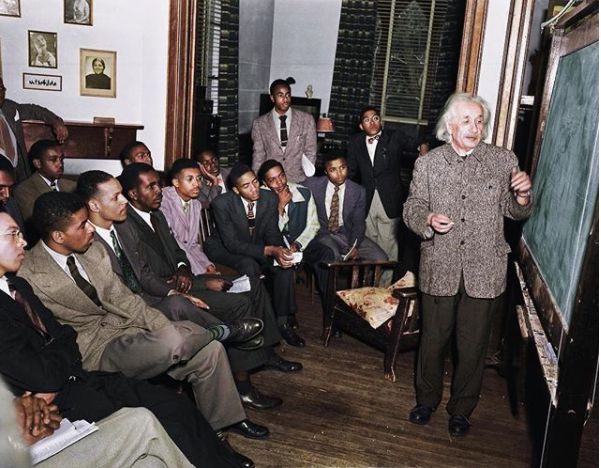We all know him: the wild hair, the mustache, the gentle smile. Einstein the quirky physicist has become a bit of a legend. He’s perhaps best known for penning his theories of relativity, which describe gravity and the movement of the cosmos at the grandest scales. But Einstein was more than just the funny image we see on t-shirts, or the genius we read about in textbooks. He was an eccentric, sometimes shunned, who sometimes took surprising stances (for his day) on social issues.
Unbeknownst to many, Einstein was an outspoken proponent of civil rights and an advocate against segregation. He lectured at a historically black college, co-chaired the co-chair the American Crusade to End Lynching, and used his fame to help out African Americans who were in trouble, once giving his hotel away to a singer who was denied a room.

Of course, it’s not always so simple, and he was called a hypocrite and an “enemy of America” by right-wing senator Joseph McCarthy, and recent stories have tried to paint him as racist because of comments in his travel diaries. Some of the comments he made were definitely troubling, especially from his visits to China, but I hope — and believe — that his overall legacy was positive. Certainly, for the time, his advocacy was radical, and probably dismissed as “idosyncratic” or part of his general weirdness.
Physics is still a field that’s low in diversity, where there aren’t nearly as many African Americans, women, or other groups (like Native Hawaiians in Hawaii) as you’d expect. It always makes me sad how this causes stress to colleagues who aren’t part of the ‘majority’ (white dudes) and sometimes I’ve been part of the problem. For example, friends and I teased female classmates in undergrad and I’m sure it was frustrating and discouraging. I’m sure I said shitty things at other times, too. I’m sorry!
I’ve also noticed that we’re hard on ourselves and each other, and people are quick to say ‘They did __ but they weren’t a very good scientist/physicist.’ The good teachers and science communicators like Neil deGrasse Tyson are somewhat looked down up, too, even though they make such a huge difference in inspiring people and reaching out to the public. I know I would never have gotten into physics without a great high school teacher (an incredible priviledge on my part!) or the popular science books and shows I enjoyed along the way.
Here’s hoping we can embrace the good weirdness and diversity and positive efforts from people like Einstein as an important part of the scientific culture! As in the 30’s, 40’s, and 50’s, when scientists from across the world came to the US, we only learn more by sharing our field with new and incredible people. It’s been a pleasure meeting colleagues from different backgrounds, lifestyles, cities, and countries, and they’re part of what makes our field of physics such an exciting place to be.



